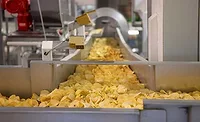Plants Prepackage Beneficial Microbes In Their Seeds
Source: American Society for Microbiology (ASM)
Researchers from the University of Notre Dame have discovered that plants may package commensal bacteria — bacteria that help the plants extract nutrients and defend against pathogen invasion — inside of seeds, thus ensuring that sprouting plants are colonized from the beginning. The scientists presented their findings today at the 5th American Society for Microbiology (ASM) Conference on Beneficial Microbes.
Plants have a symbiotic relationship with certain bacteria. These "commensal" bacteria help the plants extract nutrients and defend against invaders — an important step in preventing pathogens from contaminating fruits and vegetables. Now, scientists have discovered that plants may package their commensal bacteria inside of seeds, thus ensuring that sprouting plants are colonized from the beginning.
Plants play host to a wide variety of bacteria; the plant microbiome. Just as in humans, the plant microbiome is shaped by the types of bacteria that successfully colonize the plant's ecosystem. Most of these bacteria are symbiotic, drawing from and providing for the plant in ways such as nitrogen-fixing and leaf-protection. Pathogenic bacteria may also colonize a plant. Pathogens can include viruses and bacteria that damage the plant itself or bacteria like the Shiga-toxin producing E. coli O104:H4. In 2011, Germany, France and the Netherlands experienced an outbreak of E. coli that was ultimately traced to the consumption of contaminated sprouts, which was thought to be caused by feral pigs in the growing area. Such opportunistic contamination is hard to guard against as most growing takes place in open, outdoor spaces with little opportunity for control.
The hypothesis behind this research is that the best way to defend against pathogenic contamination is with a healthy microbiome colonized by bacteria provide protection from invasive pathogens. Just as with babies, early colonization is crucial to establishing a beneficial microbiome. The researchers, led by Shaun Lee, PhD, looked inside sterilized mung beans and were able to isolate a unique strain of Bacillus pumilus that provides the bean with enhanced microbial protection.
"This was a genuine curiosity that my colleague and I had about whether commensal bacteria could be found in various plant sources, including seed supplies," said Lee. "The fact that we could isolate and grow a bacterium that was packaged inside a seed was quite surprising."
The researchers first sterilized and tested the outer portion of a sealed, whole seed. When that was determined to be sterile, they sampled and plated the interior of the seeds and placed them in bacterial agar, which they incubated. What they found was the new strain of Bacillus pumilus, a unique, highly motile Gram-positive bacterium capable of colonizing the mung bean plant without causing any harm. Genome sequencing revealed that the isolated B. pumilus contained three unique gene clusters for the production of antimicrobial peptide compounds known as bacteriocins.
Lee and his colleagues theorize that their findings could have a wide impact, both on our understanding of plants and in creating food-safe antimicrobials. The finding that plant seeds can be pre-colonized may be an important mechanism by which a beneficial plant microbiome is established and sustained. Moreover, the team is now isolating and studying the bacteriocins, which Lee says "have tremendous potential."
Looking for quick answers on food safety topics?
Try Ask FSM, our new smart AI search tool.
Ask FSM →







